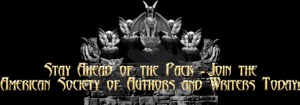|
Stephen Crane
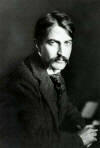 All Soul's Day marks the birthday of novelist and short
story writer, Stephen Crane. Born in Newark, New Jersey, in 1871, he
holds a place as one of America's most revered writers, although he died
before reaching his thirtieth birthday. He was the 14th child in a
family of Methodist ministers, and he said, "[They were] of the old
ambling-nag, saddle-bag, exhorting kind." His father wrote the book,
Popular Amusements (1869), which decried the evils of activities
such as gambling and baseball. All Soul's Day marks the birthday of novelist and short
story writer, Stephen Crane. Born in Newark, New Jersey, in 1871, he
holds a place as one of America's most revered writers, although he died
before reaching his thirtieth birthday. He was the 14th child in a
family of Methodist ministers, and he said, "[They were] of the old
ambling-nag, saddle-bag, exhorting kind." His father wrote the book,
Popular Amusements (1869), which decried the evils of activities
such as gambling and baseball.
Ironically enough, when his father died, Crane began a
lifelong love affair with the game of baseball. His mother moved the
family to Asbury Park, New Jersey, where her son spent his summers looking
for any pickup baseball games he could get into.
On his prep-school team, he played catcher. Unlike
a modern player, he wore nearly no protective gear. His catcher's mitt
was a leather gardening glove with some extra padding stuffed into it. Crane became
famous with his teammates for catching anything that was thrown or hit at
him, even with his bare hand. One of his teammates said, "He played
baseball with fiendish glee."
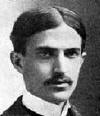 His first serious writing
assignment came when he began covering the games he played for his high school
newspaper. He went on to college, where he studied engineering,
although he never found the discipline very rewarding. "I found engineering not at all to my taste.
I preferred baseball." He toyed with the idea of moving up the
ranks from college star to professional when he was hit by the writing bug
and eventually dropped out of college. His first serious writing
assignment came when he began covering the games he played for his high school
newspaper. He went on to college, where he studied engineering,
although he never found the discipline very rewarding. "I found engineering not at all to my taste.
I preferred baseball." He toyed with the idea of moving up the
ranks from college star to professional when he was hit by the writing bug
and eventually dropped out of college.
Crane began writing for the New York tabloids while he was
a teenager. He was extraordinarily perceptive, having studied life
more than most people twice his age. "When I ought to have been at
recitations I was studying faces on the streets, and when I ought to have
been studying my next day's lessons I was watching the trains roll in and
out of the Central Station."
 After his mother's death in 1890, Crane moved to New York
to live a Bohemian lifestyle while working for his room and board as a freelance
writer and journalist. He lived among the poor in the Bowery slums in
order to research his first novel, Maggie: A Girl Of The Streets
(1893), which turned out to be a milestone in the development of literary
naturalism. Because of its brutal candor, though, no publishers were
interested in it, and Crane had to borrow money from his brother to print
the book at his own expense. Even then, he found few booksellers
who would stock it, so he ended up giving away a hundred copies and burning
the rest. "I cannot see," he said, "why people hate ugliness in art.
Ugliness is just a matter of treatment." After his mother's death in 1890, Crane moved to New York
to live a Bohemian lifestyle while working for his room and board as a freelance
writer and journalist. He lived among the poor in the Bowery slums in
order to research his first novel, Maggie: A Girl Of The Streets
(1893), which turned out to be a milestone in the development of literary
naturalism. Because of its brutal candor, though, no publishers were
interested in it, and Crane had to borrow money from his brother to print
the book at his own expense. Even then, he found few booksellers
who would stock it, so he ended up giving away a hundred copies and burning
the rest. "I cannot see," he said, "why people hate ugliness in art.
Ugliness is just a matter of treatment."
Nearly two decades after the end of the War between the
States, Crane noticed that the newspapers and magazines were filled with
stories of Civil War veterans; so, he decided to write a Civil War story
himself. Although he knew virtually nothing about the conflict, he
gathered all of the books he could find on the subject and set about his
research. The result was the publication of his novel, The Red
Badge of Courage (1895).
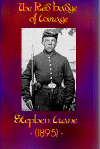 The
book was an instant hit. It was called the most
realistic war novel ever written, and no one believed the author was a
24-year-old who had never seen battle. Civil War
veterans wrote into newspapers claiming that they had known Stephen Crane.
Generals said that they had been proud to serve with him. When writer Hamlin
Garland asked Crane how he'd been able to portray the battlefield scenes so
convincingly, the author said he'd drawn on his personal experiences as an athlete. The
book was an instant hit. It was called the most
realistic war novel ever written, and no one believed the author was a
24-year-old who had never seen battle. Civil War
veterans wrote into newspapers claiming that they had known Stephen Crane.
Generals said that they had been proud to serve with him. When writer Hamlin
Garland asked Crane how he'd been able to portray the battlefield scenes so
convincingly, the author said he'd drawn on his personal experiences as an athlete.
Crane's collection of poems, The Black Rider,
appeared in the same year as his novel. The success of his books
brought him a string of reporting assignments. With the choicest plums
at his feet, he decided to become a war correspondent in various combat
areas. He traveled
to Greece, Cuba, Texas, and Mexico, writing about the conflicts there. His short
story, The Open Boat, is based on a true experience. When the
ship he was taking to Cuba hit a sandbar and sank, Crane and three other men
were forced to spend 30 hours adrift in an open boat before the author
jumped ship and swam to shore. The ordeal led to serious health
problems. Many critics consider the book to be his masterpiece.
"None of them knew the color of the
sky. Their eyes glanced level and were fastened upon the waves that swept
toward them. These waves were of the hue of slate, save for the tops, which
were of foaming white, and all of the men knew the colors of the sea. The
horizon narrowed and widened, and dipped and rose, and at all times its edge
was jagged with waves that seemed thrust up in points like rocks...A
singular disadvantage of the sea lies in the fact that after successfully
surmounting one wave you discover that there is another behind it just as
important and just as nervously anxious to do something effective in the way
of swamping boats." - from The Open Boat
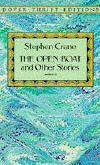 In 1898, Crane
moved to Sussex, England, where he befriended Joseph Conrad, H.G. Wells, and Henry James. During these
years, he refined his use of realism to exposing social ills, as in
George's Mother (1896), which explored life in the Bowery. In
1899, he published Active Service, which was based on the
Greco-Turkish War. That same year, he returned to Cuba to cover the
Spanish-American War, but he was soon forced back to England because of
failing health. In 1898, Crane
moved to Sussex, England, where he befriended Joseph Conrad, H.G. Wells, and Henry James. During these
years, he refined his use of realism to exposing social ills, as in
George's Mother (1896), which explored life in the Bowery. In
1899, he published Active Service, which was based on the
Greco-Turkish War. That same year, he returned to Cuba to cover the
Spanish-American War, but he was soon forced back to England because of
failing health.
Stephen Crane died on June 5, 1900, of tuberculosis
exacerbated by malaria that he had contracted in Cuba. He was only 29 years old.
Discover Stephen Crane
at Amazon.com
Indulge
Yourself - Check Out Today's Best-Selling
Fiction -
Nonfiction -
DVDs |






